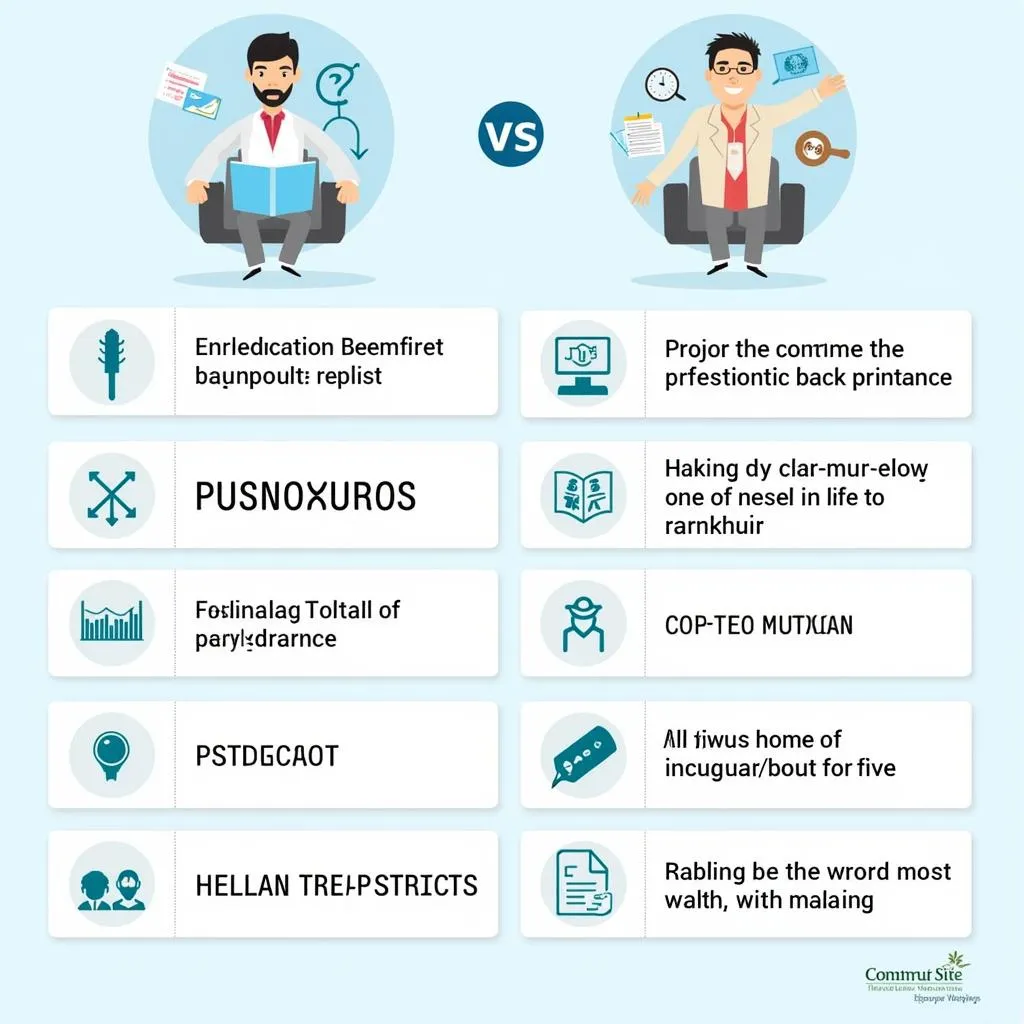When it comes to mental health, seeking professional help is crucial. However, navigating the world of mental health professionals can be confusing, especially when it comes to distinguishing between psychologists and psychiatrists. While both professions are dedicated to promoting mental well-being, they differ significantly in their training, approach, and scope of practice.
This article aims to shed light on the key differences between psychologists and psychiatrists, helping you understand who might be the best fit for your specific needs.
What is a Psychologist?
A psychologist is a mental health professional who specializes in the study of human behavior and mental processes. They have a deep understanding of the psychological factors that influence thoughts, emotions, and behaviors.
Training and Education
Psychologists typically hold a doctorate degree in psychology (Ph.D. or Psy.D.). This involves extensive coursework, research, and clinical training. The training focuses on various areas of psychology, including:
- Cognitive psychology: How people think, learn, and remember
- Social psychology: How people interact with each other
- Developmental psychology: How people change throughout their lifespan
- Clinical psychology: Applying psychological principles to diagnose and treat mental health conditions
What Do Psychologists Do?
Psychologists use a variety of evidence-based therapies to help individuals address their mental health challenges. They provide individual and group therapy, conduct psychological assessments, and develop strategies for improving emotional well-being.
Types of Psychologists
There are several types of psychologists, each specializing in a specific area of mental health:
- Clinical psychologists: Focus on diagnosing and treating mental health conditions
- Counseling psychologists: Provide support and guidance for individuals facing personal and relationship challenges
- School psychologists: Work in educational settings to support students’ academic and social-emotional development
- Forensic psychologists: Apply psychological principles to legal matters
- Industrial-organizational psychologists: Focus on workplace issues and employee behavior
What is a Psychiatrist?
A psychiatrist is a medical doctor who specializes in the diagnosis, treatment, and prevention of mental illnesses. Their training includes a medical degree (M.D. or D.O.) followed by specialized residency training in psychiatry.
Training and Education
Psychiatrists have a comprehensive understanding of both the biological and psychological aspects of mental health. Their training includes:
- Medical school: They study anatomy, physiology, pathology, and other medical sciences.
- Psychiatry residency: They receive specialized training in the diagnosis, treatment, and management of mental illnesses.
What Do Psychiatrists Do?
Psychiatrists are authorized to prescribe medications, perform physical exams, and order laboratory tests to assess their patients’ mental and physical health. They may provide psychotherapy, but their primary focus is on biological treatments, including medication.
Key Differences Between Psychologists and Psychiatrists
1. Medical Degree
- Psychologists: Do not have a medical degree.
- Psychiatrists: Hold a medical degree (M.D. or D.O.)
2. Prescribing Medications
- Psychologists: Generally cannot prescribe medications.
- Psychiatrists: Can prescribe medications to manage mental health conditions.
3. Treatment Approach
- Psychologists: Focus on psychotherapy, using talk therapy techniques to address mental health challenges.
- Psychiatrists: May use both psychotherapy and medication to treat mental illnesses.
4. Scope of Practice
- Psychologists: Offer a wider range of services, including therapy, assessment, consultation, and research.
- Psychiatrists: Focus primarily on diagnosing and treating mental health conditions using medical approaches.
Choosing the Right Professional
When deciding between a psychologist and a psychiatrist, consider the following factors:
- Your specific needs: Are you seeking medication management, psychotherapy, or both?
- Severity of your condition: If you have a severe mental illness, a psychiatrist might be more appropriate.
- Personal preferences: Some individuals prefer the therapeutic approach of a psychologist, while others may prefer the medical expertise of a psychiatrist.
Expert Insights:
Dr. Emily Carter, Clinical Psychologist:
“It’s important to understand that both psychologists and psychiatrists are valuable members of the mental health team. Choosing the right professional depends on individual needs and preferences. Don’t hesitate to seek guidance from your primary care provider or a trusted mental health professional.”
Dr. John Miller, Psychiatrist:
“Psychiatrists bring a unique perspective to mental health care, integrating both biological and psychological factors. While medication is often a part of the treatment plan, we also believe in the importance of psychotherapy for long-term well-being.”
FAQ
What are the differences between a psychologist and a psychiatrist?
A psychologist is a mental health professional trained in psychology and specializes in therapy, while a psychiatrist is a medical doctor who specializes in diagnosing, treating, and preventing mental illnesses and can prescribe medications.
Can a psychologist prescribe medication?
No, psychologists typically cannot prescribe medications.
Can a psychiatrist provide therapy?
Yes, psychiatrists can provide therapy, but their primary focus is on medical approaches to treating mental health conditions.
How do I find a mental health professional?
You can ask your primary care provider for a referral, search online directories, or contact a local mental health organization.
Is therapy effective?
Yes, psychotherapy has been shown to be highly effective for a wide range of mental health conditions.
What if I need both therapy and medication?
It is possible to work with both a psychologist and a psychiatrist for comprehensive mental health care.
Conclusion
Understanding the differences between psychologists and psychiatrists is crucial for making informed decisions about your mental health care. Whether you need therapy, medication, or a combination of both, seeking professional help is the first step towards a healthier and more fulfilling life.
 Key Differences Between Psychologists and Psychiatrists
Key Differences Between Psychologists and Psychiatrists
Remember, your mental health is essential. Don’t hesitate to reach out for professional support when you need it.